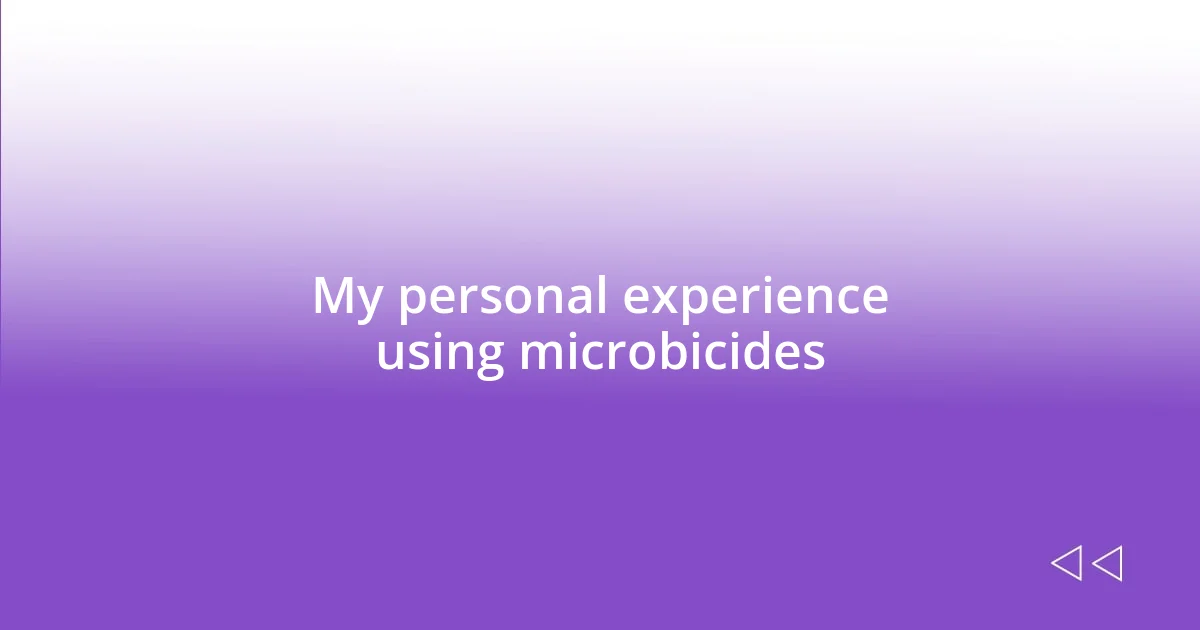Key takeaways:
- Microbicides empower individuals, particularly women, enhancing their control over sexual health and fostering open conversations about protection and STIs.
- Personal experiences highlight both the emotional relief and practical benefits of using microbicides, including improved intimacy and strengthened relationships through communication.
- The future of microbicides is promising, with advancements likely to integrate digital health solutions to enhance accessibility and encourage proactive sexual health choices.

Understanding microbicides benefits
One of the most significant benefits of microbicides is their ability to empower individuals, especially women, to take control of their sexual health. I remember speaking with a friend who felt a newfound sense of agency after using a microbicide. She described it as liberating, which made me really reflect on how essential it is for people to have options that enable them to protect themselves.
Microbicides also offer the potential for increased safety because they can be used discreetly before sexual activity. I think about the times I’ve had conversations with partners where trust and communication about protection were not as strong as they should be. Wouldn’t it be easier if everyone could access methods that provide peace of mind without relying solely on their partner’s compliance?
Moreover, they can significantly reduce the transmission of sexually transmitted infections (STIs), which is a monumental leap in public health. I’ve seen the anxiety in friends’ eyes when discussing STIs, and knowing that microbicides can lower that risk feels like progress. Isn’t it encouraging to consider how an innovative approach like this could change the landscape of sexual health for many?

How microbicides work effectively
Microbicides work effectively by creating a barrier that prevents the transmission of pathogens during sexual activities. I’ll never forget the first time I discovered that these products could come in various forms—gels, films, or even tablets—tailored to meet different preferences. This versatility means users can find a type that fits seamlessly into their intimate experiences, which feels empowering and important.
- They contain active ingredients that target and disable the viruses and bacteria involved in STIs.
- Some formulations promote vaginal health by maintaining a natural pH balance, reducing irritation.
- By allowing users to take charge of their protection, microbicides foster conversations around sexual health that I wish I’d seen more of when I was younger.
Reflecting on my own experiences, I recall feeling hesitant about discussing protection with partners. Knowing that I could use something like a microbicide might have alleviated some of that anxiety, making it easier for me to focus on the relationship rather than just the risks involved.

My personal experience using microbicides
Using microbicides in my own experience has profoundly changed how I view sexual health. I remember the first time I tried a gel formulation; it felt like a small yet significant step toward owning my protection. The sense of control was empowering, especially knowing I had an option that didn’t rely solely on my partner’s actions. It made me feel reassured, and that emotional lift was more than just a practical benefit.
Another aspect I found remarkable was the ease of integration into my routine. The first time I used a film, I was surprised at how discreetly it fit into our intimate moments. It’s an odd feeling, but there’s satisfaction in knowing you can take proactive steps without disrupting the intimacy of the experience. Plus, it opened up pathways for communication. I could say, “I’ll be using this,” instead of dancing around the topic of protection, which often felt uncomfortable before.
Throughout my journey with microbicides, I’ve also appreciated the rich conversations it has sparked with friends. Sharing our experiences helped demystify some of the fears surrounding STIs. I think back to a night out when a friend revealed they had started using a microbicide as well. Our laughter mixed with serious chats about health choices showed the growing culture of support and awareness—something that I believe is crucial in our quest for better sexual health.
| Experience | Emotional Insight |
|---|---|
| Using a gel formulation | Feeling empowered and in control |
| Using a film | Discretion and ease in intimacy |
| Sharing experiences with friends | Cultivating a supportive community |

Challenges faced during use
One challenge I faced while using microbicides was the initial discomfort with application methods. I vividly recall the first time I used a gel; the process felt foreign, and a part of me hesitated, wondering if I was doing it right. Isn’t it interesting how something designed for protection can sometimes spark feelings of self-doubt?
Another hurdle I encountered was remembering to use them consistently. Life gets busy, and I often found myself forgetting. I remember a night when I was excited about a last-minute date; in the rush, I skipped applying the product. That realization led me to ponder—how can I prioritize my health amidst the spontaneity of life?
Lastly, I learned about the importance of communication with my partner. During my experiences, I noticed varying levels of comfort discussing microbicides. I remember one conversation where my partner seemed skeptical about their effectiveness. Navigating that dialogue not only reinforced my knowledge about microbicides but also highlighted the need for open conversations about sexual health—don’t you think that being candid can enhance intimacy?

Positive outcomes from using microbicides
Using microbicides has brought tangible peace of mind to my sexual health practices. I remember the relief I felt after realizing that effective protection was within my control, rather than being dependent on external factors. It’s almost like wearing a safety net; knowing I had a barrier against STIs not only reduced anxiety but also allowed me to focus more on the moment, giving me more freedom to enjoy intimacy without worry.
The positive outcomes didn’t stop with individual reassurance. I found that using microbicides sparked engaging and meaningful conversations with my partner. Discussing our preferences in protection led to deeper discussions about our health histories, which I hadn’t considered before. It made me realize—how often do we share our perspectives on safety and well-being in a relationship? For me, these discussions have strengthened our bond and highlighted the critical role communication plays in any partnership.
I’m also amazed by how microbicides have contributed to a greater sense of community among my friends. I recall a brunch where my close friends and I started comparing our experiences. What struck me was the collective sigh of relief we shared when talking openly about our journeys with sexual health. It made me wonder—could this shared vulnerability be the key to breaking down the stigma surrounding protective measures? By supporting one another, we deepened our understanding of and commitment to safe practices together.

Tips for effective microbicide use
When using microbicides, I discovered that preparation can make a significant difference. I started setting reminders on my phone to help me stick to my routine. It sounds simple, but that little nudge not only helped me stay consistent but also shifted my mindset; suddenly, prioritizing my health felt effortless. Have you tried scheduling your health habits? It can really transform your routine.
Another tip is to experiment with different products to find what feels right for you. I tried a few types of microbicides, and just like finding the perfect pair of jeans, what works for someone else might not be ideal for you. I remember how relieved I felt when I finally found a gel that was comfortable and easy to use. It made the whole experience so much more enjoyable. What has your experience been like in sorting through options? Each choice really does shape your comfort level.
Lastly, I realized the importance of education. I made it a point to research not only the products but the science behind them. Understanding how microbicides work helped eliminate my uncertainties and empowered me in conversations with my partner. It’s fascinating to connect the dots between knowledge and confidence, isn’t it? Learning more didn’t just improve my practice—it also deepened my belief in the power of informed choices for sexual health.

Future of microbicides in healthcare
I can see a bright future for microbicides in healthcare, particularly as research continues to advance. Every time I read about new formulations in development, I feel a surge of hope. It’s encouraging to think that innovations might cater to diverse populations and empower people in their sexual health decisions. Have you ever envisioned a world where such choices are part of everyday healthcare?
Moreover, I believe that combining microbicides with digital health solutions could reshape how we approach sexual health. Imagine using an app that not only reminds you to apply microbicides but also tracks your usage and provides tailored recommendations based on your lifestyle. That’s the kind of integration I think could elevate our overall health practices. Doesn’t it sound promising to blend technology with personal care?
Finally, as more individuals advocate for their health, the conversation around microbicides is bound to grow. I recently attended a health workshop where discussions on microbicides were front and center, and it was inspiring to witness such engagement. This collective dialogue fosters awareness and can help destigmatize discussions around sexual health. How powerful would it be if we all joined in this movement to normalize these essential conversations?














